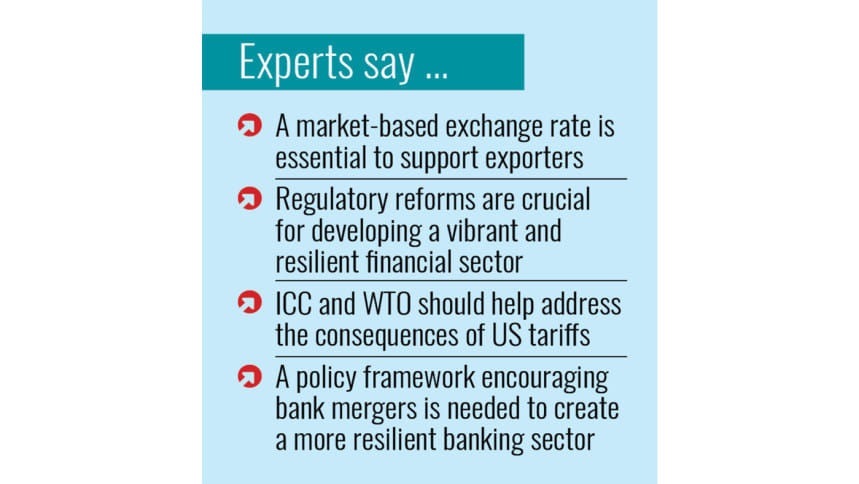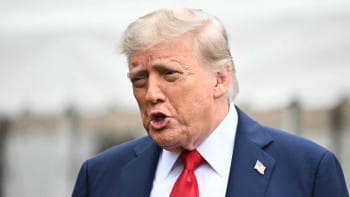US tariff hike to put pressure on banks

The hike in US tariffs is likely to put pressure on the banking sector, said business leaders and bankers in a dialogue yesterday.
They urged both the government of Bangladesh and international bodies like the International Chamber of Commerce (ICC) and the World Trade Organization (WTO) to come forward to provide solutions to deal with the challenges.
The business leaders and bankers expressed their opinions and concerns in a dialogue titled "Global Financial Trends & Reforms: Implications for Bangladesh" at a hotel in the capital.
The ICC, Bangladesh, organised the dialogue.
Mahbubur Rahman, president of ICC, Bangladesh, said the full implementation of the hike in US tariffs could significantly strain the nation's banking system.
This would come about through a reduction in export earnings, tightening of foreign currency liquidity, and a rise in non-performing loans, particularly in trade-reliant sectors, he said.
"It is therefore imperative for Bangladesh to adopt resilient financial strategies and regulatory reforms that safeguard economic stability in the face of these external shocks," he said.
He added that despite the economy's resilience in many areas, structural weaknesses within the financial sector remain a critical challenge.
AK Azad, vice-president of ICC, Bangladesh, urged the ICC and WTO to give attention to the impact of US tariffs on countries like Bangladesh.
He also underscored the need for the ICC and WTO to intervene for the settlement of insurance claims against damaged factories during political turmoil.
He urged the central bank to let the market decide the country's currency exchange rate.
Addressing Central Bank Deputy Governor Zakir Hossain Chowdhury, Azad said, "If you want to support exporters and improve forex reserves, then you should leave the exchange rate to the market, as suggested by the IMF (International Monetary Fund)."
Azad also urged business leaders to convey information to and educate the current government about the consequences of the present economic situation, especially the impact of Trump's tariffs.
Florian Witt, chair of the ICC Global Banking Commission, in his keynote, echoed the call for transformative action within Bangladesh's banking sector.
He specifically advocated for the revitalisation of state-owned banks through strategic recapitalisation and aggressive NPL reduction.
Witt also proposed a framework that encourages bank mergers to create larger, more resilient banking groups.
He emphasised addressing the challenges faced by Islamic and troubled private sector banks and the necessity of thorough forensic audits to inform potential mergers, recapitalisation efforts, and the bolstering of Tier-1 capital.
Chowdhury said Bangladesh Bank has undertaken many reform activities recently, but the time has not come yet to evaluate the results of the reforms.
He said Bangladesh Bank always consults with stakeholders, the private sector, and development partners.
Abdul Hai Sarker, chairman of the Bangladesh Association of Banks and chairman of Dhaka Bank PLC, said if all the stakeholders work together, Bangladesh can cope with the changes that are coming about.
Selim RF Hussain, chairman of the Association of Bankers Bangladesh (ABB), said globalisation was going to be very different from what it was earlier, as many geopolitical changes were coming about across the world.
There are things that cannot be influenced by small countries like Bangladesh—they can only try to respond to them, he said.
"It will be important for us to get together as a group with all the relevant stakeholders and respond to the various changes that are happening," he said.
Coordination among the various regulators and ministries needs to be far faster than it currently is, he added.
Enamul Huque, managing director of Standard Chartered Bangladesh, said Bangladesh should look for timely ways to cope with the challenges imposed by Trump's tariffs.
Bangladesh should focus more on high-value apparel items like manmade fibre (MMF), he said.
Md Mahbub Ur Rahman, chief executive officer of The Hongkong and Shanghai Banking Corporation Ltd, said the global supply chain was going through changes, including notable growth in south-south trading.
"The global context is shifting, the market is shifting, and so is the supply chain," he said, adding that this trend was opening up new markets.
Regarding the opening of letters of credit (LCs) in the country, he said many businesses in Bangladesh import their merchandise through LCs, whereas exports are done based on contracts.
"How can we strike the balance?" he asked.
Shah Md Ahsan Habib, professor at the Bangladesh Institute of Bank Management, said the problems in Bangladesh's banking sector were unique, for which it was not possible to directly follow the practices of developed countries.
"Our level of financial literacy and our understanding of risk are relatively low," he said.
Despite this, many banks and businesses are doing fantastic jobs—even their activities are replicable, he said.
Bidyut Kumar Saha, lead investment officer of the Private Sector Operations Department, Bangladesh Resident Mission of the Asian Development Bank, said many of the vulnerabilities of the banking sector are rooted within the country.
"So, irrespective of any global development in the financial sector or anything else, the ongoing reform efforts by the government and the central bank need to be carried out in full force," he said.
The ADB is happy to be working with the government and other stakeholders to this effect, he added.

 For all latest news, follow The Daily Star's Google News channel.
For all latest news, follow The Daily Star's Google News channel. 



Comments